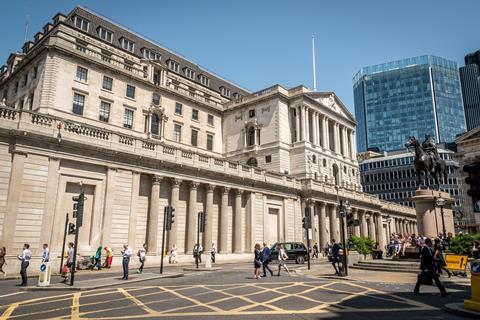Newbuild housing and RMI sectors to both slump by 4% this year before recovering in 2025, according to new forecast
Construction output is set to slump by 2.1% this year due to falls in private housing newbuild work and repair, maintenance and improvement, according to the Construction Products Association (CPA).
The industry’s two biggest sectors have been hit by increasing mortgage rates and the cost of living crisis, both symptoms of high levels of inflation in recent years.
Private housing output suffered a double-digit decline last year, with some housebuilders reporting a fall in demand of up to 35%, while ongoing regulatory issues around planning, including nutrient neutrality, have contributed to higher costs.

The sector is expected to fall by a further 4% this year, according to the CPA’s winter forecast, but rise by the same amount in 2025 if interest rates begin to fall as expected.
But the report warned that a lack of government policy stimulus to help overcome high deposit and mortgage payments means the recent housebuilding peak in 2022 is unlikely to be seen again until at least the end of the decade.
>>> See also: HS2 fallout sees Labour and construction united by common aim
Private housing repair and maintenance (RMI), the second largest construction sector, also appears to be continuing its downward trend due to householders having a lack of spare cash to pay for the works.
Fewer property purchases in 2023 has contributed to the fall in demand from new homeowners who typically make improvements within the first nine months of moving in.
RMI is likely to fall at the same rate as new private housing, 4%, this year before returning to growth of 3% next year, the CPA said, although it flagged the likelihood of a strong market in energy efficiency and insulation retrofit jobs.
Interest rates currently stand at 5.25%, the highest level in 15 years. The Bank of England will review the rate this Thursday but is not expected to reduce it following an uptick in inflation in December from 3.9% to 4%.
CPA economics director, Noble Francis said: “Even with expected falls in interest and mortgage rates in the second half of this year, rates are likely to remain relatively high and so demand in the housing market, house building sector and RMI sector is likely to remain subdued overall.”
Francis also criticised the lack of help for housing in the chancellor’s autumn statement last year. “It is critical that we see measures to help boost house building and homeownership from government in the upcoming Spring Budget,” he said.
“Furthermore, government should do more on infrastructure delivery given that the sector is set for its third consecutive fall in output. This is despite announcements from government on new projects to compensate for the cancelling of the Northern leg of HS2.”
Infrastructure, the third largest sector, is also expected to fall by 0.5% in 2024 despite work continuing on the first phase of HS2, the Hinckley Point C nuclear power station and Thames Tideway Tunnel, before rising by 1.2% next year.


























No comments yet